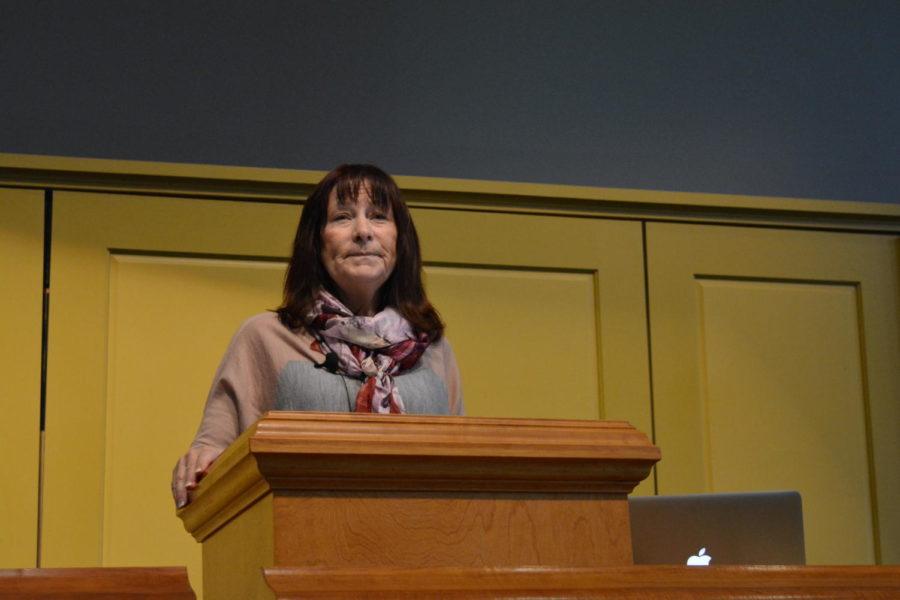Patagonia: Using business as a tool for change
April 12, 2018
Three Patagonia representatives came to Iowa State as guest designers for The Fashion Show and shared their expertise in a lecture with students on ‘using business as a tool for change.’
Patagonia has never done a fashion week before. The three representatives that came to campus were Rebecca Green Shank, Sarah Darnell and Lena Gonzalez Todd.
The lecture began with an introduction from Shank. Following the introduction was a video showcasing Patagonia’s ‘High Alpine Kit,’ which consists of various layers and several types of fabrics that are guaranteed to sustain mountain climbing conditions.
Shank then went on to highlight the fact that Patagonia participates in fair trade. According to Shank, fair trade means that an organization that works with manufacturers to provide additional money for factory workers, to low income countries. Patagonia pays an additional amount of money to participate and provide money to factory workers and to become fair trade certified.
Patagonia now has eight fair trade certified companies worldwide and they encourage everyone to support and buy all fair trade products.
Shank then touched on how climate change has affected the company’s headquarters highlighting the fact that their community was severely affected by the Thomas Fire, the largest fire in California’s history, that occured in December of 2017 and lasted for over 30 days and destroyed almost 2,000 homes and buildings and hundreds of thousands of acres of land.
“Typically California is known for its earthquakes,” Shank said. “But we weathered this catastrophic event and despite the loss of homes, colleagues and friends, we have come out of it stronger than ever.”
In February, Patagonia was named one of the top 10 innovative companies in the world. Shank wants to invite other companies to join in their fight to help save the environment.
There were two other videos following Shank’s speech. The second video introduced how Patagonia has developed hemp as a strong fabric in their lines of clothing. The third video introduced Patagonia’s ‘Workwear’ line, which is a line dedicated to specializing in the needs of specific jobs.
The rest of the lecture consisted of a Q&A session with Patagonia’s representatives and the audience. There was lot of things highlighted in the Q&A session that were not mentioned in the videos.
One of the things highlighted in how every factory Patagonia has worldwide, has set rules that does not allow for any human rights violations. There is also no pollution in their practices and Patagonia works to keep their practices sustainable. Their clean up procedures are environmentally friendly as well.
Another thing highlighted is Patagonia’s goal of trying to develop 100 percent recyclable fabrics. They have achieved at least 85 percent of their lines being delivered and recycled or recyclable materials and that includes their trims, Shank said.
Shank also delivered a message from Patagonia CEO Rose Marcario to student designers, saying to ‘have them start working on designing with recycled products because there’s not going to be a lot of resources left.’
“So my inspiration to you students of Iowa State University is to join us in our revolution to change the environmental crisis,” Shank said. “Your generation is faced with challenges that we have never seen before, we could not have foreseen in the past years. We are a strong brand, we have asked many brands to join us and we cannot do it alone. Each one of you can make a difference and I encourage you and challenge you to step up. If you’re not registered to vote, register to vote and vote the environment.”
Julie Perreault, an Iowa State alumna and previous environmental science and global resource systems major, found it interesting and inspiring how the company is taking the next steps to be environmentally sustainable and ethically responsible.
“I thought it was really interesting,” Perreault said. “I now work in water resources and I also work at an outdoor apparel store that sells a lot of Patagonia gear, so I actually get to experience talking to their representatives. It was interesting just hearing from the designers and the team of what they’re doing from an apparel standpoint and from the fashion side.”
Karoline Johnson, a senior in apparel merchandising and design, is now rethinking the direction she might take her career after listening to Patagonia speak.
“It gave me a lot to think about in terms of the environment and consumerism,” Johnson said. “I guess looking forward into the future… ‘should I just work for Forever 21 or do I have to go this route, Patagonia, kind of environmental? And I’m kind of leaning towards Patagonia because I think it was a very inspiring speech.”







